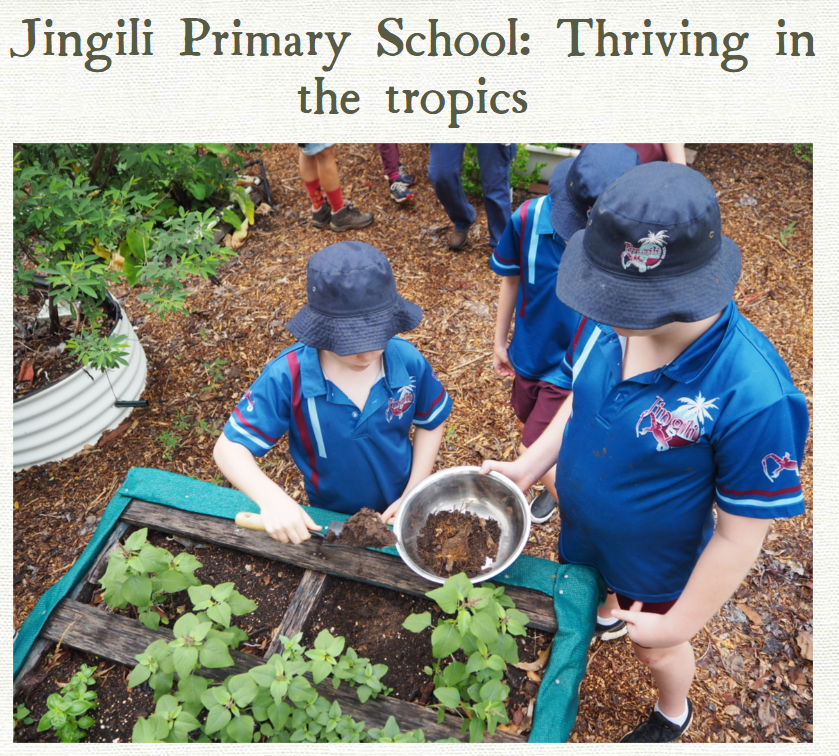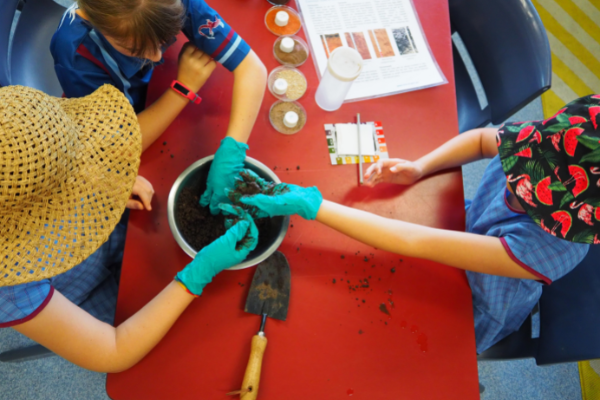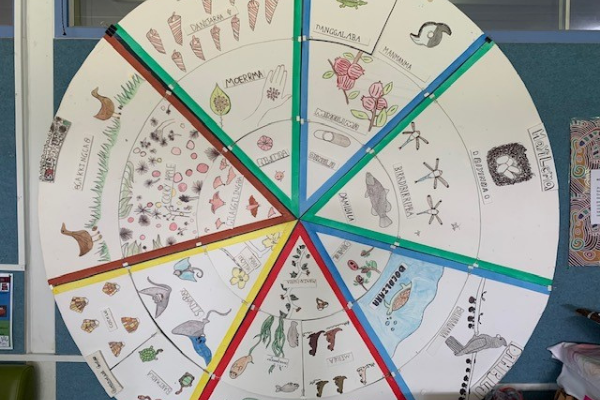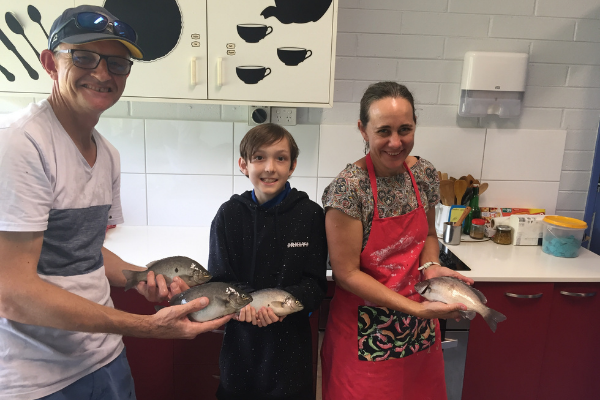Stephanie Alexander Kitchen Garden Network

We believe that this program is a great way for students to learn broadly about healthy eating, our environment, sustainability and personal and social capabilities.
– The Jodis

 Loading…
Loading…
Thursday, February 17, 2022
From the temperate forests of Tasmania to the dry red deserts of Western Australia, schools running the Kitchen Garden Program adapt to their environment. Jingili Primary School in Darwin has built a tropical oasis to weather all the seasons; from monsoonal rains to long dry spells. And the odd cyclone or two.
The school’s kitchen garden teachers, Jodi Peters and Jodi Rose (the ‘Jodis’), both grew up in Darwin. They’re passionate gardeners who love seasonal, local food and foraging for tropical fruit at the farmers’ markets. They’re attuned to the conditions, although both admit there are some unique challenges that come with running the program so far north. “The extreme weather is the main challenge,” says Jodi Peters. “It’s very wet for three months of the year and then very dry for six months. The remaining times are often hot and humid – uncomfortable to be in the garden.”
They’ve considered the seasonal changes with every aspect of planning the garden, ensuring there’s good drainage for the wet season and a watering system with wicking beds that hold in moisture for the dry spells. Something as simple as building a chook pen took the school two years to plan and raise the funds to complete, as it had to be built to meet strict cyclone codes. “It all takes extra time because it needs to be carefully engineered, and there’s obviously extra cost for that as well,” says Jodi Rose. “That is definitely a challenge. But we do have a beautiful cyclone-proof chook cage now, so we know the girls are safe!”
Adjusting to the weather cycle means there are times of the year when the whole garden can’t be used productively, and crops need to be rotated. Leading into the monsoon season, the school harvests all it can and prepares the garden beds to rest with green crops and manure to keep the weeds down. “We might put some chook grain or birdseed in there to grow, so the nutrients aren’t lost from the soil over those really heavy, rainy periods,” says Jodi Peters, “while also growing those nitrogen crops, your beans and your legumes to condition the soil. We don’t leave garden beds empty – we know the importance of maintaining that micro-organism activity.”
The team keep stock of their seed collection throughout the year, saving the freshest for the growing season. The rest get thrown into a bucket mix to be scattered over emptied garden beds and left to ‘set and forget’ over school holidays. While most garden beds are still being prepped at the start of Term 1, Asian greens and herbs such as basil and lemongrass can still be grown over the wet season, while longer growing crops such as ginger and turmeric help maintain other corners of the garden. Crops in the resting beds are chopped back and dug into the garden beds when school goes back, ready to plant out in April for the growing season, which runs from May to October.
The magic of gardening is that you need to find the right things to grow in the right season in the right place. You have to be flexible, depending on what’s in season – or something might be failing terribly that you had a bumper crop of last year, so you just have to find something else to do. Make it a learning moment!
Students begin each class with an acknowledgement of country, recognising the school is built on the traditional lands of the Gulumoerrgin (Larrakia) people. This leads into learning about Larrakia land and customs, with students taught the importance of looking after country and planting around the Larrakia Calendar. “This is a large part our teaching and learning cycle in our kitchen garden program that we value and embed,” says Jodi Peters. “The Larrakia Calendar is our accurate and relevant indicator to the seasons that are unique to this part of the country and tropical climate.
The Larrakia Calendar made by Jingili students
Recipes are designed to reflect the school’s multicultural student body, to help students connect with and celebrate each other’s cultures. The paw-paw salad was warmly received, dolmades are a favourite, and recently students love making okonomiyaki. “Darwin has always been full of many different cultures that bring unique ways of growing and cooking to this place,” says Jodi Peters. “I’ve learnt so much – how to cook cassava, for example, and that you can eat the sweet potato leaf.”
The most highly anticipated dish on the menu at Jingili is their famous yellow fish curry. The meal comes together after a year of prep in Term 3, with students involved in every step of the process. They grow the fish in the school’s aquaponics system, harvest Asian vegetables, and make the yellow curry paste together from ingredients found in the garden including turmeric, garlic, spring onions, kaffir lime leaves, galangal, ginger and lemongrass. “And it all goes into our grand finale – it’s epic – the yellow fish curry!” sys Jodi Rose.
We encourage students right from the beginning to try new foods. We ask them to activate all their senses with the food they experience. They’re not always going to like it but they know what they don’t eat will end up in the scrap bucket, which goes back into the garden. They get the bigger picture.
Preparing fish from the aquaponics system
The garden is supported by the whole community, who participate in working bees, help fillet the harvested fish, donate seedlings and produce, and bring their food scraps in to feed the compost. They even pitch in to take care of the chooks over the holiday break. “We’re well supported, but it doesn’t just happen. You have to actively seek support,” says Jodi Peters. “We have placards, notices that go in our school newsletters, we stand up at assembly and ask for help. We have to be quite present in the community, with a smile on our face at all times.”
The garden is also used as a space to check in on small groups of students who need extra wellbeing support, to “build relationship skills: working together, getting along and resilience.” The team has woven language around self-care into the program, giving students the tools to communicate their needs and practice positive thinking. “The weather is really humid and challenging when our trees are fruiting,” says Jodi Peters. “So we frame it as ‘it’s so hot out there today – but look at these beautiful mangoes! We couldn’t have mangoes without the heat.’ We highlight the benefits of the hardships as a kind of coping mechanism.”
Through all the challenges of cooking and growing in the tropics, the Jodi’s passion for their work is evident in the beautiful kitchen garden they’ve created at Jingili. Both are quick to say they have “the best job in the world.” When it comes to planning for the future, Jodi Rose says they’d like to expand the student’s understanding of soil and microorganisms, build an outdoor classroom, strengthen the bush tucker program, utilise their bamboo harvest, and throw a barramundi into the aquaponics tank. “They’re notoriously quite territorial and difficult to grow,” she says. “So we’re going to give that a go this year.”
Want to see Jingili Primary School’s kitchen garden in action? Watch as staff and students take us on a comprehensive virtual tour of their tropical garden and all its outdoor learning spaces.




